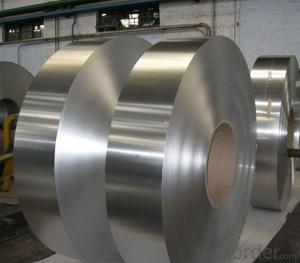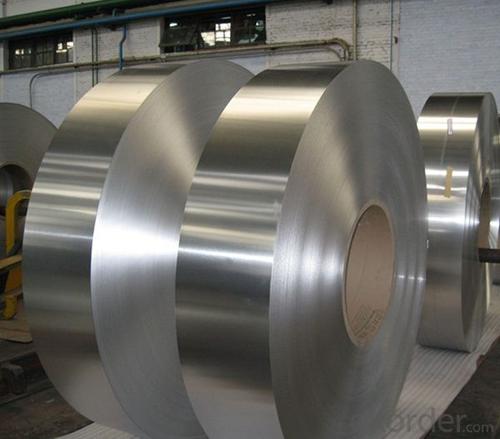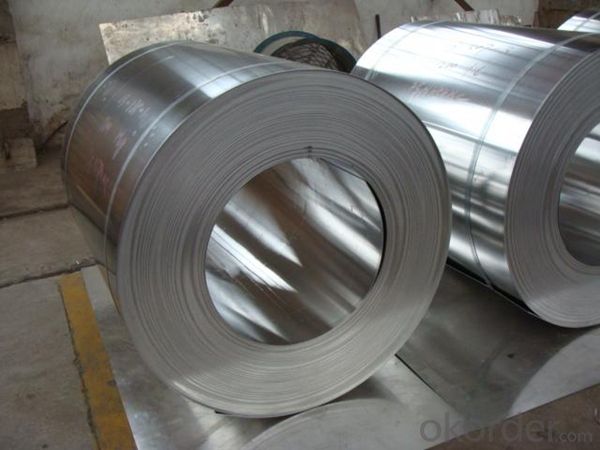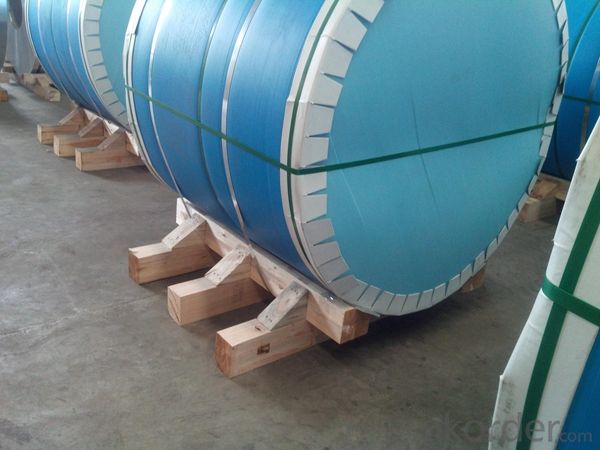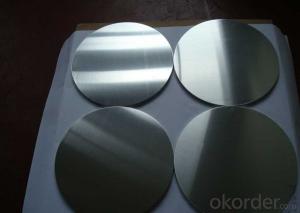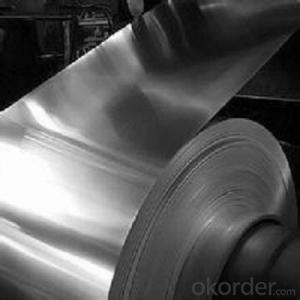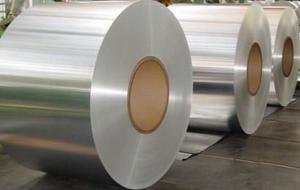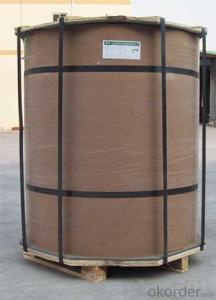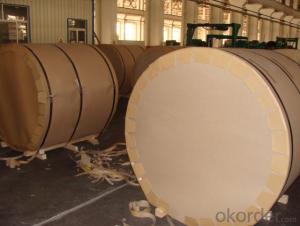030 Aluminum Coil - EN AW-1199 Mill Finished CC Aluminium Coil
- Loading Port:
- Shanghai
- Payment Terms:
- TT OR LC
- Min Order Qty:
- 5 m.t.
- Supply Capability:
- 2000 m.t./month
OKorder Service Pledge
OKorder Financial Service
You Might Also Like
Specification
1. Structure of EN AW-1199 Mill Finished CC Aluminium in Coil Form Description
EN AW-1199 Mill Finished CC Aluminium in Coil Form is one semi-finished aluminium material. This coil can be rolled down to aluminium coil,sheet,circle ect. The alloy AA1050 is widly used in building, industry ect. Its weight is much lower than steel. So many customers choosed aluminium material instead of steel.
2. Specification of EN AW-1199 Mill Finished CC Aluminium in Coil Form
EN AW-1199 Mill Finished CC Aluminium in Coil Form | |
Main Specification | |
Alloy | AA1xxx (AA1050, AA1060, AA1070, AA1100 etc.) |
AA3xxx (AA3003, AA3004, AA3005, AA3105 etc.) | |
AA5xxx, AA6XXX (AA5052,AA5083, AA5754, AA6061, AA6062 etc.) | |
AA8xxx(AA8011, AA8006 etc.) | |
Temper | H14,H16, H18, H22, H24, H26, H32,O/F, T4, T6, T651 |
Thickmess | 0.01mm-100mm |
Width | 30mm-1700mm |
Standard | GB/T 3880-2006/ASTM |
Special specification is available on customer's requirement | |
3. Application of EN AW-1199 Mill Finished CC Aluminium in Coil Form
(1).Interior: wall cladding, ceilings, bathrooms, kitchens and balconies, shutters, doors...
(2).Exterior: wall cladding, facades, roofing, canopies, tunnels,column covers , renovations...
(3).Advertisement: display platforms, signboards, fascia, shop fronts...
4. Feature of EN AW-1199 Mill Finished CC Aluminium in Coil Form
Surfact Quality :
Be free from Oil Stain, Dent, Inclusion, Scratches, Stain, Oxide Dicoloration, Breaks, Corrosion, Roll Marks, Dirt Streaks and other defect which will interfere with use,
Mechenical Property:
Chemical Composite and Mechanical Property
5. Certificate of EN AW-1199 Mill Finished CC Aluminium in Coil Form
SGS and ROHS(if client request, paid by client), MTC(plant provided), Certificate of Origin(FORM A, FORM E, CO), Bureau Veritas and SGS (if client request, paid by client), CIQS certificate
6. Image of EN AW-1199 Mill Finished CC Aluminium in Coil Form
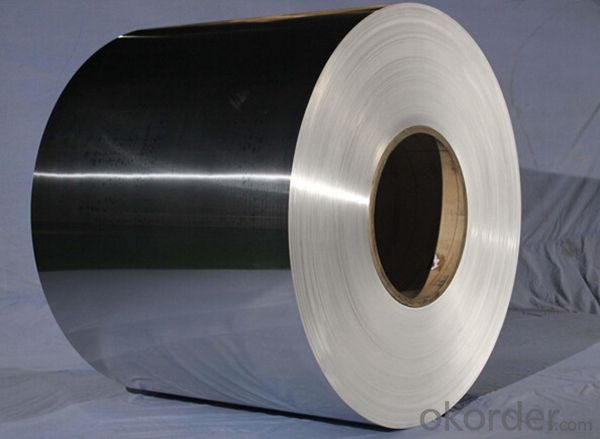
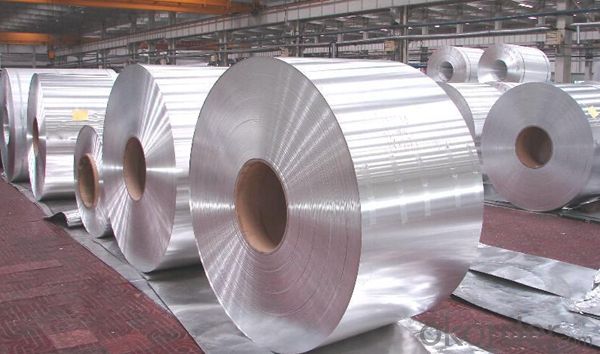
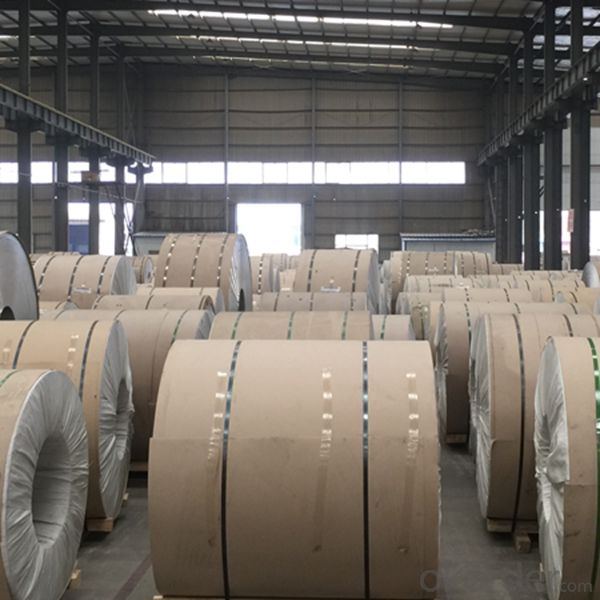
7. Package and shipping of EN AW-1199 Mill Finished CC Aluminium in Coil Form
First, plastic cloth with drying agent inside; Second, Pearl Wool ; Third, wooden cases with dry agent , fumigation wooden pallets, aluminum surface could cover blue PVC film
8. FAQ
1) What is the delivery time?
Depends on actual order, around 20 to 35 days
2) What is the QC system:
We have QC staff of 20 persons and advanced equipment, each production is with MTC traced from Aluminum ingot lot.
3) What market do you mainly sell to?
Australia, America, Asia, Middle East, Western Europe, Africa etc
- Q: Can aluminum coils be used in corrosive gas environments?
- Yes, aluminum coils can be used in corrosive gas environments. Aluminum has a natural oxide layer that provides excellent corrosion resistance, making it suitable for various corrosive environments including those with corrosive gases. However, it is important to consider the specific corrosive gas and its concentration, as certain gases may still have a corrosive effect on aluminum over time.
- Q: What are the different color coating options for aluminum coils?
- There are various color coating options available for aluminum coils, depending on the specific requirements and preferences of the customer. Some common color coating options include: 1. Polyester (PE) Coating: This is one of the most popular coating options for aluminum coils. Polyester coatings provide excellent color retention, durability, and resistance to UV radiation, making them suitable for both indoor and outdoor applications. 2. Polyvinylidene Fluoride (PVDF) Coating: PVDF coatings offer superior weather resistance, chemical resistance, and color stability. They are highly durable and can withstand harsh environmental conditions, making them suitable for architectural applications. 3. High-Durability Polyester (HDP) Coating: HDP coatings are specifically formulated to provide enhanced durability and resistance to fading, chalking, and abrasion. They are commonly used in demanding applications where long-term color retention and performance are critical. 4. Silicone Modified Polyester (SMP) Coating: SMP coatings provide good weather resistance, flexibility, and color stability. They are often used in industrial and commercial applications that require a balance between performance and cost-effectiveness. 5. Polyurethane (PU) Coating: PU coatings offer excellent chemical resistance, flexibility, and adhesion properties. They are commonly used in applications that require resistance to chemicals, solvents, and harsh weather conditions. Additionally, various color options are available within each coating type, allowing customers to choose from a wide range of colors and finishes. Some manufacturers also offer custom color matching services to meet specific design requirements. It is important to note that the selection of the appropriate color coating option for aluminum coils should consider factors such as the intended use, environmental conditions, durability requirements, and aesthetic preferences. Consulting with a trusted supplier or coating specialist can help determine the most suitable color coating option for a specific application.
- Q: Who knows Xingtai aluminum shutter door how much is one square meter?
- East of the ox horn, that is, the South and the junction, then ask yourself, will not be a big difference
- Q: Can aluminum coils be used in the production of chemical storage tanks?
- Yes, aluminum coils can be used in the production of chemical storage tanks. Aluminum is a versatile and durable material that offers several advantages for chemical storage applications. It is corrosion-resistant, which makes it suitable for storing a wide range of chemicals. Additionally, aluminum is lightweight, which makes it easier to transport and install compared to other materials like steel. It is also non-magnetic, which can be beneficial in certain applications. However, it is important to consider the specific requirements of the chemicals being stored and consult with experts or manufacturers to ensure that aluminum is the appropriate choice for the intended use.
- Q: How are aluminum coils used in the packaging industry?
- Aluminum coils are used in the packaging industry for a variety of purposes. These coils can be formed into different shapes and sizes to create packaging materials such as cans, containers, and foils. The lightweight nature of aluminum makes it ideal for packaging as it reduces transportation costs and is easily recyclable. Additionally, aluminum coils have excellent heat conductivity, making them suitable for food and beverage packaging as they can help maintain product freshness and prevent spoilage. Overall, aluminum coils play a crucial role in the packaging industry by providing durable, lightweight, and customizable solutions for various products.
- Q: What is the typical coil width for aluminum coils?
- The specific application and industry determine the typical coil width for aluminum coils. Generally, it can range from a few inches to several feet. In the construction, automotive, and packaging industries, common coil widths typically range from 12 to 72 inches. These widths are chosen based on manufacturing process requirements, final product dimensions, and coil processing equipment. It is important to mention that customer needs and the aluminum coil manufacturer's production capabilities may lead to customized coil widths.
- Q: Can aluminum coils be used in the production of chemical storage tanks?
- Yes, aluminum coils can be used in the production of chemical storage tanks. Aluminum is a versatile and durable material that offers several advantages for chemical storage applications. It is corrosion-resistant, which makes it suitable for storing a wide range of chemicals. Additionally, aluminum is lightweight, which makes it easier to transport and install compared to other materials like steel. It is also non-magnetic, which can be beneficial in certain applications. However, it is important to consider the specific requirements of the chemicals being stored and consult with experts or manufacturers to ensure that aluminum is the appropriate choice for the intended use.
- Q: How are aluminum coils tested for surface adhesion?
- Aluminum coils are tested for surface adhesion through various methods to ensure the quality and performance of the material. One common method is the tape test, where a piece of adhesive tape is applied firmly to the surface of the coil and then quickly removed. The adhesion is evaluated by assessing the amount of coating or paint that comes off with the tape. If excessive coating is removed, it indicates poor surface adhesion. Another method involves using a cross-cut or knife test, where a grid pattern is cut into the surface of the coil using a sharp blade. The grid is then covered with an adhesive tape and quickly removed. The adhesion is evaluated by examining the amount of coating or paint that is removed from the cut lines. If there is minimal or no coating removal, it indicates good surface adhesion. In addition, the pull-off adhesion test is often conducted using specialized equipment. This test involves attaching a device to the surface of the coil and applying a gradually increasing force until the coating or paint starts to detach. The force required to cause the detachment is measured, and it provides a quantitative measure of the surface adhesion strength. Overall, these testing methods help manufacturers assess the surface adhesion of aluminum coils and ensure that they meet the required standards for various applications, such as in the automotive, aerospace, or construction industries.
- Q: Can aluminum coils be used in building facades?
- Building facades can indeed incorporate aluminum coils. Due to its numerous advantages, aluminum is a favored material for such applications. Its lightweight nature, durability, and resistance to corrosion make it ideal for exterior use. Furthermore, aluminum coils can be shaped into various forms and sizes, enabling limitless design possibilities. Additionally, aluminum offers a wide selection of finishes, such as anodized, painted, and coated, enhancing customization options for building facades. Moreover, aluminum is an environmentally sustainable material as it can be 100% recycled, making it an eco-friendly choice for construction projects. In conclusion, aluminum coils offer both aesthetic appeal and functional performance, making them a feasible choice for building facades.
- Q: Are aluminum coils suitable for pharmaceutical vial caps?
- Yes, aluminum coils are suitable for pharmaceutical vial caps. Aluminum is a preferred material for pharmaceutical packaging due to its excellent barrier properties, which help to protect the contents of the vials from moisture, oxygen, and other contaminants. Aluminum coils can be easily formed into caps of various sizes and shapes to fit different vial types. Additionally, aluminum is a lightweight material, making it convenient for transportation and handling. Moreover, aluminum is resistant to corrosion, ensuring the integrity of the vial caps during storage and use. Overall, aluminum coils are a suitable choice for pharmaceutical vial caps due to their barrier properties, versatility, and durability.
Send your message to us
030 Aluminum Coil - EN AW-1199 Mill Finished CC Aluminium Coil
- Loading Port:
- Shanghai
- Payment Terms:
- TT OR LC
- Min Order Qty:
- 5 m.t.
- Supply Capability:
- 2000 m.t./month
OKorder Service Pledge
OKorder Financial Service
Similar products
Hot products
Hot Searches
Related keywords
